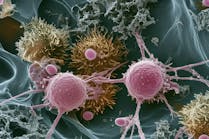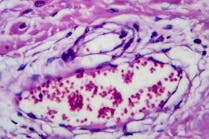In a new article published in Nature Communications, researchers at Moffitt Cancer Center demonstrate how a deep-learning model using positron emission tomography (PET)/computerized tomography (CT) radiomics can identify which non-small cell lung cancer patients may be sensitive to tyrosine kinase inhibitor treatment and those who would benefit from immune checkpoint inhibitor therapy, according to a press release from Moffitt Cancer Center.
Choosing the right therapy for a non-small cell lung cancer patient is not an easy decision, as biomarkers can change during therapy rendering that treatment ineffective. The model uses PET/CT imaging with the radiotracer 18F-Fluorodeoxyglucose, a type of sugar molecule. Imaging with 18F-FDG PET/CT can pinpoint sites of abnormal glucose metabolism and help accurately characterize tumors.
“This type of imaging, 18F-FDG PET/CT, is widely used in determining the staging of patients with non-small cell lung cancer. The glucose radiotracer used is also known to be affected by EGFR activation and inflammation,” said Matthew Schabath, PhD, associate member of the Cancer Epidemiology Department. “EGFR, or epidermal growth factor receptor, is a common mutation found in non-small cell lung cancer patients. EGFR mutation status can be a predictor for treatment, as patients with an active EGFR mutation have better response to tyrosine kinase inhibitor treatment.”
For the study, the Moffitt team developed an 18F-FDG PET/CT-based deep learning model using retrospective data from non-small cell lung cancer patients at two institutions in China: Shanghai Pulmonary Hospital and Fourth Hospital of Hebei Medical University. The model classifies EGFR mutation status by generating an EGFR deep learning score for each patient. Once created, the researchers further validated the model using patient data from two additional institutions: Fourth Hospital of Harbin Medical University and Moffitt Cancer Center.
“We found that the EGFR deep-learning score was positively associated with longer progression-free survival in patients treated with tyrosine kinase inhibitors, and negatively associated with durable clinical benefit and longer progression-free survival in patients being treated with immune checkpoint inhibitor immunotherapy,” said Robert Gillies, PhD, chair of the Cancer Physiology Department. “We would like to perform further studies but believe this model could serve as a clinical decision support tool for different treatments.”





